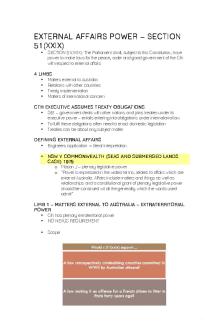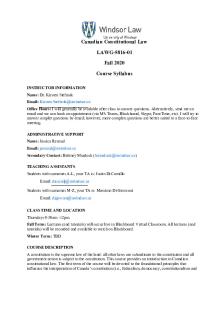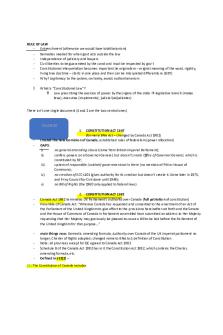Constitutional Law 4 limbs PDF

| Title | Constitutional Law 4 limbs |
|---|---|
| Course | Constitutional Law |
| Institution | University of South Australia |
| Pages | 7 |
| File Size | 170 KB |
| File Type | |
| Total Downloads | 71 |
| Total Views | 160 |
Summary
Download Constitutional Law 4 limbs PDF
Description
EXTERNAL AFFAIRS POWER – SECTION 51(XXIX) •
SECTION 51(XXIX): The Parliament shall, subject to this Constitution, have power to make laws for the peace, order and good government of the Cth with respect to external affairs
4 LIMBS • Matters external to Australia • Relations with other countries • Treaty implementation • Matters of international concern CTH EXECUTIVE ASSUMES TREATY OBLIGATIONS • S61 – government deals with other nations and joins treaties under its executive power – entails entering into obligations under international law • To fulfil these obligations often need to enact domestic legislation • Treaties can be about any subject matter DEFINING EXTERNAL AFFAIRS • Engineers application = literal interpretation •
NSW V COMMONWEALTH (SEAS AND SUBMERGED LANDS CASE) 1975 o Mason J – plenary legislative power o “Power is expressed in the widest terms; relates to affairs which are external Australia. Affairs include matters and things as well as relationships and a constitutional grant of plenary legislative power should be construed wit all the generality which the words used admit”
LIMB 1 – MATTERS EXTERNAL TO AUSTRALIA – EXTRATERRITORIAL POWER • Cth has plenary extraterritorial power • NO NEXUS REQUIREMENT •
Scope
o POLYUKHOVICH V CTH 1991 ! Legislation made it a retrospective crime for people who held Australian citizenship (at the time the legislation was introduction) to have engaged in war crimes in WWII ! No requirement that a person held Australian citizenship during WWII itself for them to be guilty !
Mason CJ, Deane, Dawson, Gaudron and McHugh JJ • Confirmed that S51 (29) gives Cth plenary power to make legislation for matters external to Aus. • Dismissed need for a nexus between the legislating Parl and the matter being regulated
o XYZ V CTH 2006 ! While in Thailand, Aus. citizen engaged in sexual relations with a non-citizen, non-resident of Aus. under the age of 16 ! When returned to Aus., prosecuted under Aus. law which makes it illegal for a citizen or resident to have sexual or indecent relations with children under 16 in any country ! Court to decide whether Aus. was able to criminalise conduct undertaken by Aus. citizens outside country border ! Held permissible even if legal in foreign country ! Kirby J – law valid as it regarded Australia’s relationship with other nations o “The word ‘external’ is precise and is unqualified. If a place, person, matter or thing lies outside the geographical limits of the country, then it is external to it and falls within the meaning of the phrase ‘external affairs’. Similar statements of the doctrine are to be found in the reasons for judgment of other Justices…They must now be taken as representing the view of the Court” – ILO o Policy question – should there be a nexus? Should the courts revisit Brennan J’s reasoning in Poly case that a nexus should be required? LIMB 2 – RELATIONS WITH OTHER COUNTRIES • R V SHARKEY 1949 o Decide whether the federal parliament had the power to extend the offence of sedition to the excitement of disaffection against the government or constitution of other dominions o Latham CJ - supported by s. 51(xxix), because the “relations of the Commonwealth with all countries outside Australia, including other
Dominions of the Crown, are matters which fall directly within the subject of external affairs”
•
KOOWARTA V BJELKE-PETERSEN 1982 o To cover laws regarding relations with “international person” such as the UN and other intergovernmental organisations
LIMB 3 – TREATY IMPLEMENTATION • Treaty/covenant/convention etc. is an agreement between 2 or more countries • Not self-executing nor automatically part of domestic law – Com Parl must make law specifying the obligations – Koowarta • Cth can implement any treaty regardless of subject matter – Tas Dams; Richardson •
KOOWARTA V BJELKE-PETERSEN 1982 o K was Aboriginal man and member of Wik nation o K planned to purchase the Archer River cattle station which covered traditional come land o Later Commission made a contract to purchase the property but was blocked by QLD government o B, premier of QLD, didn’t approve the sale because he argued that Aboriginal people shouldn’t be able to acquire large areas of land o K argued blocking as discriminatory o Issue: whether the EA HOP could support the implementation of the International Convention on the Elimination of all Forms of Racial Discrimination in the form of the Racial Discrimination Act (Cth) o Held Racial Discrimination Act valid o Mason, Murphy and Brennan J – Cth had power to implement any treaty which it had ratified, regardless of the subject matter
•
Limitations o Bona fide ! Cth can only incorporate treaties into domestic law that have been entered into in good faith – Koowarta o Specificity - ILO ! Obligation to promote full employment or to minimise drug death may not be sufficiently specific enough to be implemented under S51 (xxix) o Conformity ! Cth legislation conform with international agreement ! E.g. cannot be used to authorise law which promotes racial discrimination
!
!
ILO: “To be a law with respect to external affairs, the law must be reasonably capable of being considered appropriate and adapted to implementing the treaty” Cth can legislate so as to implement treaty obligations as well as matters which are reasonably incidental to those treaty obligations – Richardson
o Obligation ! RICHARDSON V FORESTRY COMMISSION • Cth Act established a Commission of inquiry to determine whether 2 areas of Tas forests qualified for inclusion on the World Heritage List – (Cth relying on UNESCO Convention) • Could Cth legislate to protect land that may be heritage listed in the future • Yes • Cth can legislate so as to implement treaty obligations as well as matters which as reasonably incidental to those treaty obligation !
VICTORIA V CTH - THE ILO CASE 1996 • Federal government enacted Industrial Relations Reform Act 1993 (IRRA) which introduced a number of significant changes • Created new Australia-wide uniform obligations on employers regarding minimum wage, equal pay, termination, discrimination and family lave • Amendments based on treaty obligations of the International Labour Organisation (ILO) • States argued that Cth power to legislate with respect to EA didn’t extent to implementation of treaty obligations unless the subject matter was of international concern • Held they could implement recommendations which give effect to treaty obligations
!
Post Tas Dam - Cth could implement treaty obligations
!
Post Richardson – Cth could implement treaty obligations AND matters reasonably incidental to those obligations
!
After ILO – Cth can implement treaty obligations, matters reasonably incidental to treaty obligations, recommendations that are directly referable to treaty obligations and possibly also “mere recommendations”.
LIMB 4 – MATTER OF INTERNATIONAL CONCERN
•
• •
To provide authority for the Cth to implement legislation with regard to matters which are not extraterritorial, which do not directly affect international relations, and which are not authorised by the power to implement treatises XYZ – Kirby J – concept was underdeveloped Hesitation by Callinan and Heydon JJ o “There are immense difficulties facing any court wishing to recognise, as a matter of decision, the international concern doctrine. The arguments advanced in this case have not resolved those difficulties. In these circumstances it would not be right to uphold the legislation impugned in this case by reliance on the doctrine.
CORPORATIONS POWER – SECTION 51(XX) •
Parliament shall, subject to this Constitution, have power to make laws… with respect to: o (xx)) Foreign corporations, and trading or financial corporations formed within the limits of the Constitution
2 MAIN ISSUES • 1. What corporations can be regulated under S51 (xx)? – Definition? • 2. What kinds of laws can the Cth make with respect to these corporations? – Scope EARLY APPROACH • Initially HC gave the corporations power a very limited scope – based in the adherence to the reserved powers doctrine (Cth laws be read narrowly so as to reserve significant power to the states) – little control over corporate activities HUDDART PARKER V MOOREHEAD 1909 • Huddart Parker company formed under Vic law o Company and managed fined give pounds each for refusing to answer certain questions in relation to suspected offences under the Act o Challenged the imposition of the fines o Argued that the relevant sections of the Act were invalid because they were beyond the Cth’s power under S51 (xx) o Sections of the Act which imposed fines prohibited foreign, trading or financial corporations from engaging in agreements in restraint of trade, or from trade monopolies, in relation to all trade and commerce within Cth o Griffith CJ: S51 (xx) only to control the legal capacity of corporations; did not permit the Cth to control the operations of corporations – the control of which is exclusively reserved to the States
o Majority relied on the reserved state powers doctrine o Isaac J dissent: S51 (xx) permitted the Cth to regulate the conduct of corporations in their transactions that affect the public. But Cth should not be able to regulate internal management of corporations, only dealings between corporation and other persons o Result – Huddart Park left the Cth with little power to regulate corporate activities AFTER HUDDART PARKER • Reserved power doctrine rejected in Engineer’s Case 1920 • After the reserved powers doctrine was set aside, it was open to reserve Huddart Parker, yet its authority prevailed for another 60 years • Although Com governments attempted to alter the corporation power 4 times, each proposal was rejected at referendum (1911, 1913, 1919, 1926) •
STRICKLAND V ROCLA CONCRETE PIPES 1971 o Overturned Huddart Parker o Keith Edgar William Strickland brought charges against Rocla and others for offences against S43 of the Trade Practises Act 1965-1969 o Strickland argued that Rocla contravened S42 of the act by not proving copies of the agreements to the then Trade Practise Commission o R argued that the Trade Practises Act did not apply to it as a constitution under S51 (xx) o HCA held that the Trade Practises law could be regulated by a grant of power under S51 (xx) o Result: Cth can regulate trading activities of trading corporations
WHICH CORPORATIONS? • Foreign corporations o Corporations formed outside the limits of the Commonwealth •
Trading and financial corporations formed with the limits of the Com o What are trading and financial corporations? o What does “formed within the limits of the Commonwealth” mean?
“TRADING CORPORATIONS”: PURPOSE OF ST GEORGE COUNTY COUNCIL 1974 • Issue was whether the St George Council was a “trading corporation” under S51 (xx) • Majority 3:2 decided that a local government entity, which sold electricity and electrical appliances, was not a trading corporation •
•
Gibbs & Menzies JJ: look at the original purpose that the corporation was formed for. It was a “local government corporation” rather than a “trading corporation” o If serves the public it is not a trading corporation Barwick CJ and Stephen J: look at the current activities of the corporation
!...
Similar Free PDFs

Constitutional Law 4 limbs
- 7 Pages

Constitutional Law
- 5 Pages

Constitutional law syllabus
- 13 Pages

Citizenship Constitutional Law Notes
- 10 Pages

Constitutional-Law-Flowchart
- 8 Pages

Constitutional Law model questions
- 42 Pages

Constitutional Law 1- Bernas
- 1,442 Pages

Constitutional Law Reviewer
- 227 Pages

Week 5- Constitutional Law
- 44 Pages

Constitutional Law Reviewer midterm
- 161 Pages

Australian Constitutional Law Notes
- 65 Pages

Constitutional LAW Outline
- 73 Pages

LS1537 - UK Constitutional Law
- 6 Pages

Constitutional Law Outline
- 30 Pages

Constitutional Law Map
- 15 Pages
Popular Institutions
- Tinajero National High School - Annex
- Politeknik Caltex Riau
- Yokohama City University
- SGT University
- University of Al-Qadisiyah
- Divine Word College of Vigan
- Techniek College Rotterdam
- Universidade de Santiago
- Universiti Teknologi MARA Cawangan Johor Kampus Pasir Gudang
- Poltekkes Kemenkes Yogyakarta
- Baguio City National High School
- Colegio san marcos
- preparatoria uno
- Centro de Bachillerato Tecnológico Industrial y de Servicios No. 107
- Dalian Maritime University
- Quang Trung Secondary School
- Colegio Tecnológico en Informática
- Corporación Regional de Educación Superior
- Grupo CEDVA
- Dar Al Uloom University
- Centro de Estudios Preuniversitarios de la Universidad Nacional de Ingeniería
- 上智大学
- Aakash International School, Nuna Majara
- San Felipe Neri Catholic School
- Kang Chiao International School - New Taipei City
- Misamis Occidental National High School
- Institución Educativa Escuela Normal Juan Ladrilleros
- Kolehiyo ng Pantukan
- Batanes State College
- Instituto Continental
- Sekolah Menengah Kejuruan Kesehatan Kaltara (Tarakan)
- Colegio de La Inmaculada Concepcion - Cebu
